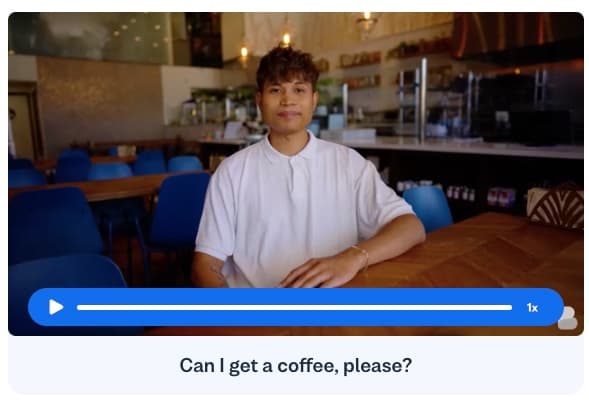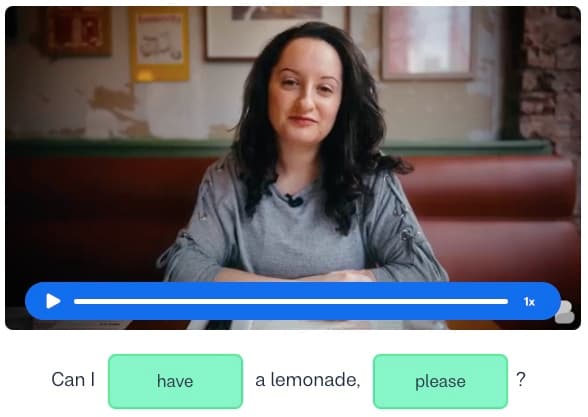I want to learn...
In English, you can specify the exact type of question you want to ask with the help of question words like “what”, “who”, “how”, and “why”. There are many more which we’ll look at too! In this article, we’ll show you how to use question words effectively in a sentence. The more questions you ask, the more you’ll learn. This is why learning how to ask questions in English is a great way to build your knowledge.
Question words in English
Because there are different contexts in which you may want to ask a question, you’ll be relying on what are known as “question words” to help you do just that. We’ll quickly move onto some examples to get an idea of what question words there are in the English language, before looking at how these sentences are constructed:
“What is that over there?”
“Does that shirt come in a bigger size?”
“Who is he?”
“How do you walk so fast?”
“Which book should I choose?”
“Has she received my text?”
“Is that the time?”
With the help of questions (and question words), you can uncover more information from the person you’re speaking or writing to. You can also read our guide on English interview questions. You might face these at some point if you’re planning on preparing for a job interview.
What is a question word?
Question words are useful if you want to be able to specify a context for your sentence. It also gives the recipient of the sentence an indication as to how they should respond to you. In the case of “Which book should I choose?”, you might be asking them to choose one out of a pile from your room, in a library, or in your local bookshop. Using these question words can help you improve your conversations in English as well.
Auxiliary verbs and modal verbs
However, question words come with their own rules. In most cases, you can create a question by putting an auxiliary verb or a modal verb at the start of a sentence. Examples of auxiliary verbs are “do”, in the present tense (“Do you like tennis?”), and “have” in the perfect tense (“Have you seen that film?”). Modal verbs are useful in that they can indicate a possibility or a necessity. Of course, when you’re asking a question, you’re probably open to the possibility of something happening (or not). Maybe you’ve made a request – you’re not sure whether the recipient will say “yes” or “no”.
Some common modal verbs include:
Will
May
Could
Should
Would
Might
Must
Here’s an example of a modal sentence:
“Should I walk the dog?”
“Should” is modal here because you’re asking the recipient whether or not you should walk the dog. Although you'll find auxiliary verbs in many questions, there’s a different rule to remember when it comes to sentences with the verb “to be” as the main verb.
The verb “to be”
When the verb “to be” is the main verb in the sentence, you don’t have to use an auxiliary verb. All you need is the verb “to be”.
Take for example the below question word:
“Is it going to rain?”
If you’re speaking to someone and asking them a question, it’s useful to be aware of the pitch of your speech. If you’re asking a question, your pitch goes up during the final word. Look at the below example:
“Is it fun?”
Your pitch should go up when placing emphasis on the word “fun”.
Now you’ve probably noticed that our above question words are in the present tense. So next, we’ll look at question words and sentence structure when tenses change.
The verb “to be” and tense
“Is” is a conjugation of the verb “to be” in the present tense. Use it as a question word when you want to ask about something in the present. You can also use it to discuss something happening in the future. This is the case in our example: “Is it going to rain?” However, if you wanted to ask about something that happened in the past, you would use the conjugation “was”.
To create a question with the main verb “to be”, just take that verb and place it at the beginning of the sentence. For example, “it was fun” becomes“was it fun?” by swapping the places of “was” and “it”.
Good to know: If you’re talking about the future, you might use some auxiliary verbs too. You can ask “is it going to rain?”, but you can also ask “will it rain?” “Will” is a modal auxiliary verb, which in this case means it’s predictive and suggests the possibility that it may (or may not) rain. Auxiliary modal verbs are particularly useful if you’re talking about the future, and you’ll more often than not find them in this context.
Knowing how to use question words correctly helps you to ask questions with clarity and ease. Just remember the placement of auxiliary verbs and modal verbs – they go at the beginning of a sentence. However, when you’re using the verb “to be” as the main verb, you’ll need to move this to the beginning of the sentence instead. While you’re learning how to use question words, we recommend familiarizing yourself with how the verb “to be” works with pronouns like “I”, “you”, “he”, “she”, or “it”.
Newlanguages


